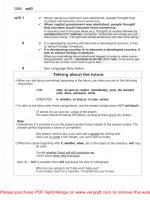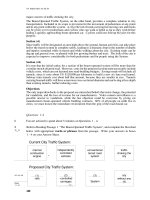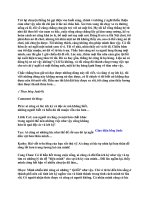Tài liệu Opportunities in technical writing careers part 10 pdf
Bạn đang xem bản rút gọn của tài liệu. Xem và tải ngay bản đầy đủ của tài liệu tại đây (92.76 KB, 10 trang )
basis for class discussions about its subject matter, which is the pur-
pose of audiovisual projects.
In preparing a script, think about how it will look to the viewer
and what effect your material will have on the audience. Once the
script is written, consider what cinematography techniques you
could employ to enhance the value and effectiveness of your work.
This is an opportunity to give your creative imagination a workout.
To create a great script, consider the following suggestions.
1. Determine the nature of your audience.
2. Do extensive research on your subject before you write a
single line.
3. Simplify your message.
4. Tell a creative, visual story.
5. Write narration with eloquence, and dialogue with
character.
6. Work with the director and the production crew throughout
the entire filmmaking process.
A smart scriptwriter will take advantage of the expertise of all
who are associated with the project. By soliciting their advice, coop-
eration, and suggestions, you will make your job easier and ensure
the success of your film. A successful DVD will make the mem-
bers of your audience receptive to your message and leave them
feeling that they have learned something valuable.
Technical Films and DVDs
The technical or scientific film can be an effective way of selling a
company’s services or products. Film and DVDs play an increas-
ingly important role in the training of technical and nontechnical
Duties of the Technical Writer 81
employees and present another area in which the trained technical
communicator can find stimulating employment. Scriptwriters do
most of the technical writing in the production of films and discs.
This position can be interesting because it involves a multifaceted
medium—communication that is linked with visual aids. Techni-
cal films are used for a variety of reasons:
• A film or DVD cuts across many audiences. It may be inter-
esting to a large group of people and yet, at the same time, have a
more specialized appeal to a particular smaller group.
• It can accomplish things that the product by itself may not be
able to do and that a still photograph can do in only a limited way.
Through drawings and cartoons, the film or video can enlarge
views, reduce them, allow one to see inside a device, linger over it,
and repeat it—all in motion.
• Films and DVDs have impact. Research has revealed that the
combination of sight and sound impresses ideas and facts most
emphatically upon the audience.
Once the central idea for the film has been determined, the man-
uscript is written that will be put together with action shots to make
the final film. As the scriptwriter, you must decide what type of
audience is being targeted—whether it is a group of specialists,
managers, or people who are unfamiliar with the subject. This is a
most critical stage for the technical scriptwriter.
Motion picture production is a complicated and costly proce-
dure. If you decide to pursue a career in scriptwriting, it would be
a good idea to get some training in this kind of writing in high
school or college. And, although it isn’t absolutely necessary, you
will certainly benefit by knowing something about photography.
Courses in cinematography would be advisable as well.
82 Opportunities in Technical Writing Careers
You’ll have to visit shooting sites to become familiar with the
location to be described in the script. And just as with any other
writer, you must have an in-depth understanding of the product.
The story line is usually developed first. This is a kind of syn-
opsis, or highly concentrated version of speech, action, and narra-
tion. Next, the actual motion picture shooting begins, scene by
scene. Then the film will be reviewed, and as the scriptwriter, you
may be asked to write a narration, which is an accompaniment to
what the action means, usually spoken by a professional actor or
reader hired for the purpose. Words must be written that are eas-
ily spoken and understood and that synchronize with the pho-
tographed action.
Technical Translation
When most of us think of technical writing, we probably think of
writing in English for an American audience about American tech-
nology, or perhaps writing in French for Canadian readers. But
technical writing is universal, and a growing number of technical
writers must work with translations—reading them, evaluating
them, and sometimes retranslating them from poorly written
English into usable prose.
If you can write in Spanish, German, French, Japanese, Chinese,
Hindi, or any other major language, you may find a job waiting for
you in technical communications.
You can see the importance of technical translations as a career
in the science or business sections of the New York Times or the Wall
Street Journal. It is also evident in the technical magazines found in
engineering libraries or in online publications, where you can find
articles that have been translated from foreign languages into
English.
Duties of the Technical Writer 83
Most major businesses and industries are global in nature, and
the majority of large American and Canadian companies could not
exist in their present form if they weren’t able to communicate with
companies and people in other countries. The electronics, chemi-
cal, and transportation industries and computer hardware and soft-
ware manufacturers, among others, need manuals, reports, research
papers, and technical advertisements that can be translated into for-
eign languages.
Industry professionals agree that global companies must publish
in a variety of languages to reach a world market. Customers want
to read instructions and manuals in their own languages and are
more likely to purchase a product that offers this option. This is
something to keep in mind as you study to become a technical
writer. If you have any facility in a foreign language, continue to
develop it. You never know when it may be a skill that appeals to a
prospective employer and will give you an advantage over other
applicants.
Document Coordination
Many technical writers and editors move beyond technical writing
into document coordination. This role is frequently a management
position and may include responsibility for the entire document
production process. This involves following each document from
the initial meeting with the client, in which the document’s speci-
fications are determined and the various activities of the research-
ers clarified, to the final publication and presentation to the client.
The document coordinator also is involved in any modifications
made in response to suggestions from the clients.
This function demands strong interpersonal and managerial
skills, because document coordination requires the ability to elicit
84 Opportunities in Technical Writing Careers
material from the technical staff (who are often reluctant to write
their research results), to interact with clients who may be uncer-
tain of their actual needs in a particular document, and to work
within personnel and budget constraints imposed by the company’s
administration.
The document coordinator often is required to visit job sites,
help with data gathering and analysis, monitor the production of
graphics, perform public relations functions on behalf of the com-
pany, control production costs, and perform a multitude of other
activities. You may think these duties are beyond the scope of tech-
nical writing, but they quickly become great sources of challenge
and satisfaction to the able individual.
Technical Editors
As in any editorial field, the primary responsibility of a technical
editor is to constantly make decisions. Working in this field, you
will have to decide whether the draft you are reviewing meets the
quality criteria of the organization. You will make the final deci-
sion of whether to accept, reject, or revise the material, all with an
eye to meeting a deadline. In effect, the quality of the final draft
rests with you.
Among the many decisions a technical editor makes every day,
a good number concern the form of a document rather than its sub-
stance. The editor must decide whether the words in the draft are
the best ones to convey the author’s meaning.
A technical editor at the Naval Explosive Ordnance Disposal
Facility in Maryland has offered some thoughts about the profes-
sion. We think his words are a fitting summary for this section:
We can say that the qualified technical editor is a sort of special-
ized jack-of-all-trades. He or she melds literature and science,
Duties of the Technical Writer 85
understands people, implements management policy, is objective,
steers steadfastly toward a goal, and remembers minutiae. He or
she can adroitly answer the writer’s questions such as: Why are
you taking the zap out of my draft? Why are you asking me what
the test objectives are when I’ve already explained them in my
report? What is your reason for requesting a rewrite with differ-
ent conclusions? Why are you deleting the entire paragraph on
potted electronic circuits?
Sample Job Advertisements
The following want ads show that interesting opportunities await
those who have the requisite skills.
Video Scriptwriter
Firm that consults in corporate training and development is look-
ing for a scriptwriter to create scripts for short video vignettes for
a brand new project. Project would require full narrative scriptwrit-
ing for two to three key characters (project leader, their manager,
and mentor) taking them through an entire project. Previous expe-
rience in creating client specific training or scriptwriting for simi-
lar projects is required.
Advertising Copywriter
Interested in fine and performing arts, foreign films, documen-
taries, and business training programs? Video distributor seeks ver-
satile and self-disciplined copywriter with college degree and three
to four years’ experience to write copy and assist with video scripts
and preparation. Applicant must have excellent verbal and writ-
ten English skills and be detail-oriented.
86 Opportunities in Technical Writing Careers
The following job description is from an institute that serves a
number of companies in the construction business.
Secure and write construction-related articles through visits to
design offices, building sites, and individuals involved. Report con-
struction news including that obtained at sponsored conventions.
Rewrite and amplify press release material received from out-
side sources. Edit construction-related papers and articles obtained
from outside sources. Applicants should have experience or train-
ing in technical writing as well as in engineering and science.
To show the widespread opportunities in technical and profes-
sional writing, here is a sample job description from a pharmaceu-
tical company.
A leader in manufacturing and marketing pharmaceutical prod-
ucts on a worldwide basis, we seek a scientifically oriented writ-
ing professional who can initiate, develop, and coordinate our
various communication requirements as follows: prepare scientific
reports from raw medical data, investigators’ brochures, package
inserts, medical abstracts, and product information summaries.
Review manuscripts for publication and marketing pieces for tech-
nical accuracy. Successful candidate should have a B.S. in chem-
istry, biology, or pharmacy, plus three years’ writing experience.
Large vs. Small Companies
Large companies produce specialists. One person writes theory,
another assembles parts lists, another coordinates with typists or
illustrators. Most people are not involved with tasks outside their
small area of activity.
In a smaller company (which is where many jobs may be located)
a publications person, particularly a writer, must be a generalist. In
Duties of the Technical Writer 87
a smaller publications department, one with perhaps from five to
fifty people, a writer is usually responsible for a project from sched-
uling through printing. This includes outlining, writing, laying out
rough schematics and drawings, coordinating with clerical help,
directing the photography of equipment, making parts lists, plan-
ning the final layout of the book, and preparing the printer’s assem-
bly sheets.
A human resources manager in an electronics company states
that the increased need for technical writers can be attributed to a
growth in the use of computers by relatively unsophisticated
employers. Computers are used in virtually every business, no mat-
ter how small. While large companies can afford to employ com-
puter specialists, in small companies the employees themselves must
become the specialists with the aid of properly written instructions.
This presents another possible employment situation to explore.
If you are particularly interested in computer science, try the
smaller companies, and make sure that you include computers in
your technical writing curriculum.
Opportunities for Advancement
To move up the career ladder, the technical writer can become a
supervisor or a department manager. Managers may supervise not
only technical writers, but also the people engaged in illustration,
graphics, photography, and distribution. In short, supervisors mobi-
lize their departments to produce the specified printed matter, be
it a report, manual, or technical article.
The technical writer works at the center of advances in com-
munication. When you join an organization, you may find your-
self learning new methods of using graphics, transferring ideas and
88 Opportunities in Technical Writing Careers
facts to paper using current technology, and translating from one
language to another. You will become a member of an organiza-
tional team, using your technical communications skills to assist
engineers in presenting their ideas and designs. By interacting with
the marketing staff, you’ll find out what research is being done and
help plan for new products.
Once you have become fully integrated into the organization and
have mastered the skills mentioned above, you may find that one
of the best opportunities for advancement involves becoming a
supervisor or a department manager. Managers may supervise not
only technical writers, but also the people engaged in illustration,
graphics, photography, and distribution. In short, supervisers mobi-
lize their departments to produce the specified printed matter, be
it a report, manual, or technical article.
Importance of Teamwork
During their careers, technical writers come in contact with the
management, research, and production divisions of their compa-
nies. This contact emphasizes the fact that the technical writer is
part of a team.
You may wonder just what is meant by teamwork. In brief, it
means contributing your skills as a writer or editor to a project at
the same time that other people you are working with contribute
theirs. Here are a few examples.
• You will undoubtedly have to work with nonwriters, people
who may do very little technical writing throughout their careers.
They may be engineers, managers, personnel people, artists, or
audiovisual experts. Remember that they are experts in their fields,
Duties of the Technical Writer 89
even if they aren’t writers. Sometimes you may have to call on these
colleagues to provide the basis of a report or a research project or
to suggest an illustration to go along with an important piece of
work. They may give you sketchily produced work: the sentence
structure may be poor or confusing; the style may not be your idea
of good writing; the grammar may violate what you have learned
in school. And this is where you act as part of a team, by acknowl-
edging that each of you excels in your own area. You’ll soon learn
that the illustrator is a far better illustrator than you will ever be;
the researcher is a far better chemist than you will ever be. Each
contributes his or her special knowledge and experience to produce
a successful project.
• You will frequently work with people who have given little
thought to the kinds of readers they need to attract. In this case, it
would be up to you to ask the author of a scientific paper you are
editing such questions as: How much do your readers already know
about the subject? How “technical” must your terminology be? Do
you have to spell out everything? These are the questions of a team
worker, and they must be asked with much tact and a great deal of
consideration for people’s feelings.
Suppose you have been given the job of coordinating a proposal
that is submitted to NASA. Your company thinks that it can pro-
duce a superior electrical system for a missile, and NASA is defi-
nitely interested in hearing about it. It is up to you to get all the
technical data on the electrical system from the engineers who have
designed and tested it. Their data probably will be in the form of
reports, test sheets, and innumerable calculations. Your job will be
to sort out this huge amount of communication and present the
90 Opportunities in Technical Writing Careers









